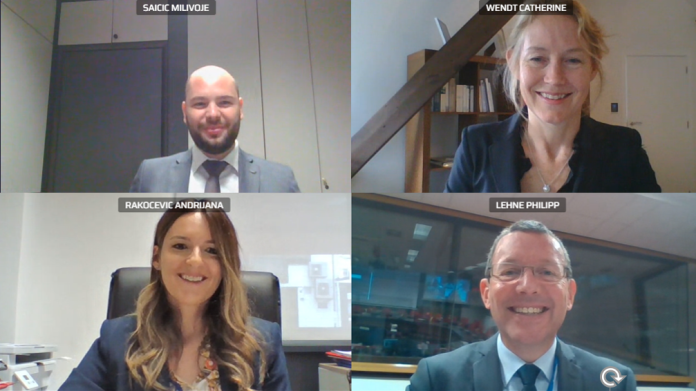Over the previous period, Montenegrin institutions have continued to fulfil their obligations and reach European standards in the areas of agriculture, food safety and fisheries. Progress in these areas is ongoing, but administrative capacity needs to be further strengthened, both for legislative alignment and for implementation of EU pre-accession assistance to rural development. This was assessed at the 14th meeting of the Agriculture and Fisheries Sub-committee between Montenegro and the European Commission, which was held today in an online format.
Progress made in Chapters 11 – Agriculture and Rural Development, 12 – Food Safety, Veterinary and Phytosanitary Affairs and 13 – Fisheries in the period since the previous meeting, held on 6 October 2020, was presented at this meeting.
Representatives of the Ministry of Agriculture, Forestry and Water Management and the Directorate for Food Safety, Veterinary and Phytosanitary Affairs presented the achieved results, current activities as well as plans for the next period.
Opening the Sub-committee meeting, Chief Negotiator Zorka Kordić pointed out that Montenegro has been encouraged by the messages of the first political Intergovernmental Conference held in June 2021, as well as those that arrived yesterday from the highest EU officials at the Brdo Summit, which confirmed that the door of EU is open to Montenegro. She expressed her belief that, in the coming period, our institutions will intensify efforts and reforms in all fields with the aim of adopting standards and achieving the quality of life that will ultimately lead to EU membership.
“From the perspective of a candidate country whose main strategic and foreign policy priority is EU membership, I am pleased to note that, after yesterday’s EU-Western Balkans Summit, it is now clear to everyone that the European integration process has withstood all obstacles in this very difficult period, which once again proved our mutual commitment and sincere intentions. We now have concrete instruments for that – the revised negotiation methodology and the Economic and Investment Plan for WB”, Kordić said.
She said that the Montenegrin administration worked diligently in all areas covered by this Sub-committee and that implementation of all planned activities under the negotiating chapter 11 – Agriculture and Rural Development has continued, with a focus on drafting new strategic documents and further strengthening administrative capacity for the proper implementation of the Common Agricultural Policy and the Common Fisheries Policy.
As regards the negotiating chapter 12 – Food safety, veterinary and phytosanitary supervision, she pointed out that numerous activities were undertaken in terms of improving the quality of raw milk, improving facilities in order to make them fully compliant with EU requirements, and accreditation of agricultural products for export to the EU.
With regard to the negotiating chapter 13 – Fisheries, she expressed the expectation that the Law on Structural Measures, Market Organization and State Aid in Fisheries and Aquaculture and the Law on Market Organization in Fisheries and Aquaculture would be adopted by the end of the year, following the positive opinion of the European Commission.
She emphasized the active role of Montenegro in implementation of the EU Strategy for the Adriatic-Ionian Region (EUSAIR), which is recognized as one of the early integration measures in the light of the New Methodology, through which Montenegro will gradually build its capacities for more successful EU membership.
Head of the Unit for Montenegro and Serbia at the Directorate-General for Neighbourhood and Enlargement Negotiations (DG NEAR) Catherine Wendt underlined that the Sub-committee is an important opportunity to review Montenegro’s progress in the EU accession negotiations in the areas of agriculture and rural development (chapter 11), food safety, veterinary and phytosanitary policy (chapter 12) and fisheries (chapter 13), for which the upcoming Commission’s annual report on Montenegro will provide further guidance.
Catherine Wendt acknowledged the hard work of Montenegro’s administration over the previous period. She hopes that challenges related to staff changes, legislative alignment process and implementation of the EU Instrument for Pre-accession Assistance for Rural Development (IPARD) will be overcome in a near future. “This is essential in order to make it possible for the EU support and funding to continue supporting Montenegrin farmers and agricultural companies in developing their businesses and rural areas, and in participating more in the EU agriculture market”, she noted.
Secretary of the Ministry of Agriculture, Forestry and Water Management Milivoje Saičić thanked the European Commission for the support it provides to Montenegro on its European path, which is reflected in financing of numerous programmes and projects and providing expert support in meeting the standards of EU member states, aimed at legal harmonisation and implementation of rules and regulations in the field of agriculture and rural development, fisheries and food safety, veterinary and phytosanitary affairs.
He pointed out that the corona virus pandemic in 2020 caused a drop in the gross domestic product (GDP) of Montenegro by 15.3%, which resulted in the EUR 765 million loss for the Montenegrin economy.
“The Montenegrin economy has suffered the biggest loss in tourism as the main generator for the sale of agricultural and fish products, which made it extremely difficult for farmers and fishermen to survive, not to mention how difficult it was to enter into new investments. In addition to the difficult sale, all inputs used in production have become significantly more expensive, which has additionally burdened the already vulnerable agricultural producers. With all this in mind, when adopting the Agro-Budget for 2021, we have conceived the measures in a way to facilitate the agricultural producers to exercise their right to financial assistance and make it more accessible to them. In that sense, we have increased the funds allocated from the national budget by EUR 2.8 million”, Saičić said.
He said that, despite numerous challenges on a daily basis, the Ministry is constantly focused on agricultural producers and preserving their incomes, as well as on preserving rural areas.
GENERAL SECRETARIAT OF THE GOVERNMENT OF MONTENEGRO
SECTOR FOR INFORMING THE PUBLIC ABOUT THE EU AND THE EU ACCESSION PROCESS


